Roberts A.D. The Cambridge History of Africa, Volume 7: from 1905 to 1940
Подождите немного. Документ загружается.

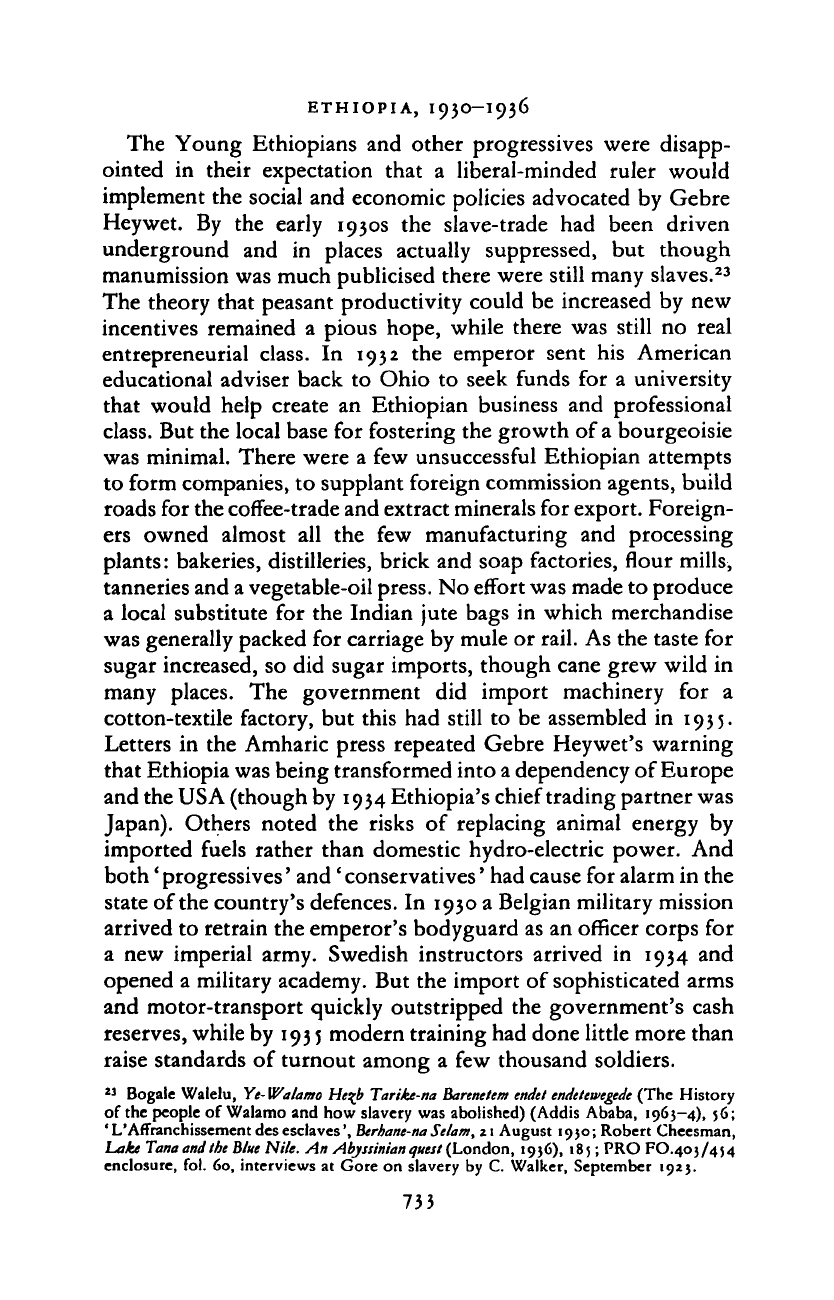
ETHIOPIA, 1930-1936
The Young Ethiopians and other progressives were disapp-
ointed
in
their expectation that
a
liberal-minded ruler would
implement the social and economic policies advocated by Gebre
Hey wet.
By the
early 1930s
the
slave-trade
had
been driven
underground
and in
places actually suppressed,
but
though
manumission was much publicised there were still many slaves.
23
The theory that peasant productivity could be increased by new
incentives remained
a
pious hope, while there was still
no
real
entrepreneurial class.
In
1932
the
emperor sent
his
American
educational adviser back
to
Ohio
to
seek funds
for a
university
that would help create
an
Ethiopian business and professional
class.
But the local base for fostering the growth of
a
bourgeoisie
was minimal. There were a few unsuccessful Ethiopian attempts
to form companies, to supplant foreign commission agents, build
roads for the coffee-trade and extract minerals for export. Foreign-
ers owned almost
all the few
manufacturing
and
processing
plants: bakeries, distilleries, brick and soap factories, flour mills,
tanneries and a vegetable-oil press. No effort was made to produce
a local substitute for the Indian jute bags
in
which merchandise
was generally packed for carriage by mule or rail. As the taste for
sugar increased, so did sugar imports, though cane grew wild in
many places.
The
government
did
import machinery
for a
cotton-textile factory, but this had still
to
be assembled
in
1935.
Letters
in
the Amharic press repeated Gebre Heywet's warning
that Ethiopia was being transformed into
a
dependency of Europe
and the USA (though by
1934
Ethiopia's chief trading partner was
Japan).
Others noted
the
risks
of
replacing animal energy
by
imported fuels rather than domestic hydro-electric power. And
both' progressives' and
'
conservatives' had cause for alarm in the
state of the country's defences. In 1930 a Belgian military mission
arrived to retrain the emperor's bodyguard as an officer corps for
a new imperial army. Swedish instructors arrived
in
1934 and
opened a military academy. But the import of sophisticated arms
and motor-transport quickly outstripped the government's cash
reserves, while by
193 5
modern training had done little more than
raise standards of turnout among
a
few thousand soldiers.
21
Bogale Walelu, Ye-Walamo
He%b
Tarike-na Baremtem
endet endetewegede
(The History
of the people of Walamo and how slavery was abolished) (Addis Ababa, 1963-4), 56;
'L'Affranchissementdesesdaves',
Btrhane-naSelam,
21
August 1930; Robert Cheesman,
Lake Tana and the Blue Nile.
An
Abyssinian quest (London, 1936), 185; PRO FO.403/454
enclosure, fol. 60, interviews at Gore on slavery by C. Walker, September 1923.
733
Cambridge Histories Online © Cambridge University Press, 2008
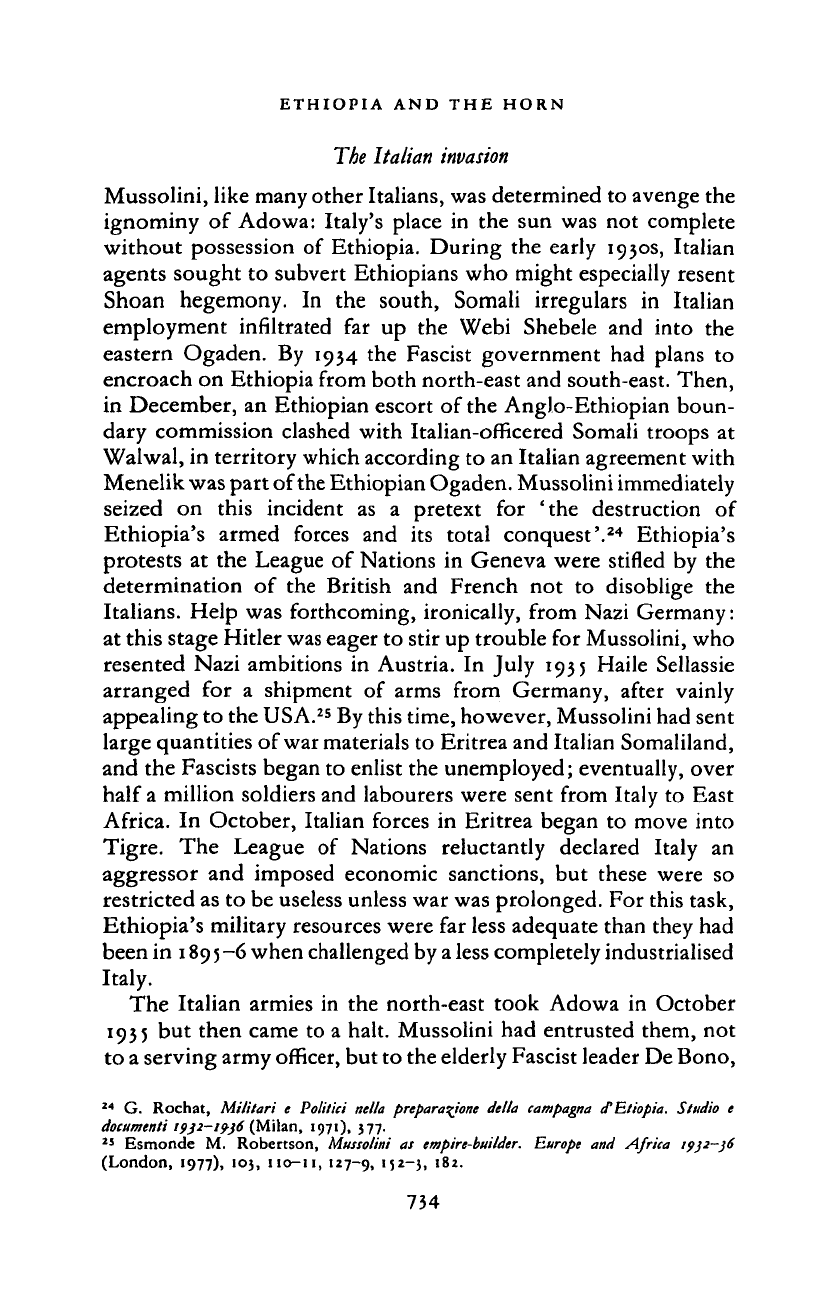
ETHIOPIA AND THE HORN
The Italian
invasion
Mussolini, like many other Italians, was determined to avenge the
ignominy
of
Adowa: Italy's place
in the sun
was
not
complete
without possession
of
Ethiopia. During
the
early 1930s, Italian
agents sought
to
subvert Ethiopians who might especially resent
Shoan hegemony.
In the
south, Somali irregulars
in
Italian
employment infiltrated
far
up the
Webi Shebele
and
into
the
eastern Ogaden.
By
1934
the
Fascist government
had
plans
to
encroach on Ethiopia from both north-east and south-east. Then,
in December,
an
Ethiopian escort of the Anglo-Ethiopian boun-
dary commission clashed with Italian-officered Somali troops
at
Walwal, in territory which according to an Italian agreement with
Menelik was part of the Ethiopian Ogaden. Mussolini immediately
seized
on
this incident
as a
pretext
for
'the
destruction
of
Ethiopia's armed forces
and
its
total conquest'.
24
Ethiopia's
protests
at the
League
of
Nations
in
Geneva were stifled
by the
determination
of
the
British
and
French
not
to
disoblige
the
Italians. Help was forthcoming, ironically, from Nazi Germany:
at this stage Hitler was eager to stir up trouble for Mussolini, who
resented Nazi ambitions
in
Austria.
In
July 1935 Haile Sellassie
arranged
for a
shipment
of
arms from Germany, after vainly
appealing to the USA.
25
By this time, however, Mussolini had sent
large quantities of war materials to Eritrea and Italian Somaliland,
and the Fascists began to enlist the unemployed; eventually, over
half
a
million soldiers and labourers were sent from Italy
to
East
Africa.
In
October, Italian forces
in
Eritrea began
to
move into
Tigre.
The
League
of
Nations reluctantly declared Italy
an
aggressor
and
imposed economic sanctions,
but
these were
so
restricted as to be useless unless war was prolonged. For this task,
Ethiopia's military resources were far less adequate than they had
been in 18
9
5 -6 when challenged by
a
less completely industrialised
Italy.
The Italian armies
in the
north-east took Adowa
in
October
1935
but
then came to
a
halt. Mussolini had entrusted them,
not
to a serving army officer, but to the elderly Fascist leader De Bono,
24
G.
Rochat, Militari
e
Politic/ nella preparation! delta campagna ifEliopia. Studio
e
documenti
19)2—1?}6(Milan,
1971),
377.
25
Esmonde
M.
Robertson,
Mussolini
as
empire-builder.
Europe
and
Africa
iyj2-j6
(London, 1977),
103,
IIO-II,
127-9, M
2
~3i
l
&*-
734
Cambridge Histories Online © Cambridge University Press, 2008
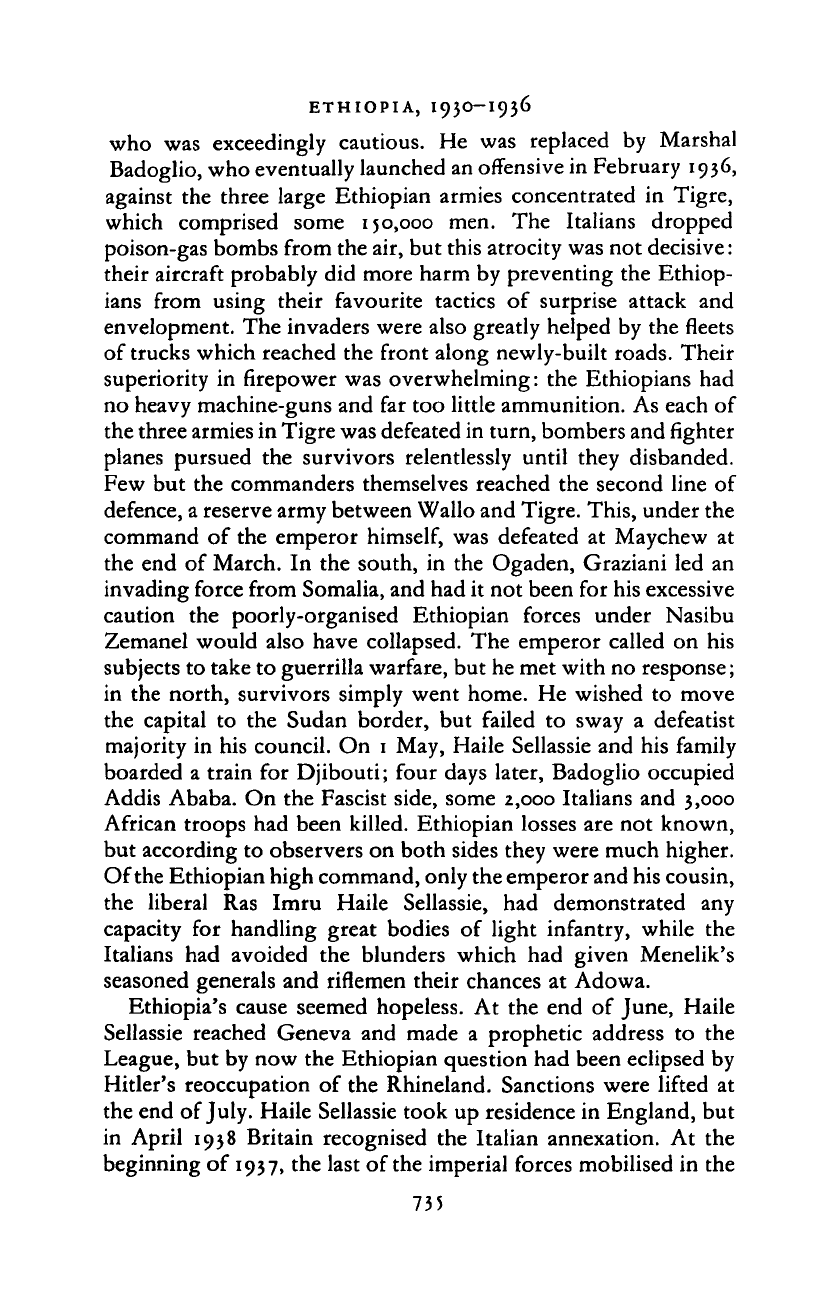
ETHIOPIA, 1930-1936
who was exceedingly cautious. He was replaced by Marshal
Badoglio, who eventually launched an offensive in February 1936,
against the three large Ethiopian armies concentrated in Tigre,
which comprised some 150,000 men. The Italians dropped
poison-gas bombs from the air, but this atrocity was not decisive:
their aircraft probably did more harm by preventing the Ethiop-
ians from using their favourite tactics of surprise attack and
envelopment. The invaders were also greatly helped by the fleets
of trucks which reached the front along newly-built roads. Their
superiority in firepower was overwhelming: the Ethiopians had
no heavy machine-guns and far too little ammunition. As each of
the three armies in Tigre was defeated in turn, bombers and fighter
planes pursued the survivors relentlessly until they disbanded.
Few but the commanders themselves reached the second line of
defence, a reserve army between Wallo and Tigre. This, under the
command of the emperor
himself,
was defeated at Maychew at
the end of March. In the south, in the Ogaden, Graziani led an
invading force from Somalia, and had it not been for his excessive
caution the poorly-organised Ethiopian forces under Nasibu
Zemanel would also have collapsed. The emperor called on his
subjects to take to guerrilla warfare, but he met with no response;
in the north, survivors simply went home. He wished to move
the capital to the Sudan border, but failed to sway a defeatist
majority in his council. On 1 May, Haile Sellassie and his family
boarded a train for Djibouti; four days later, Badoglio occupied
Addis Ababa. On the Fascist side, some 2,000 Italians and 3,000
African troops had been killed. Ethiopian losses are not known,
but according to observers on both sides they were much higher.
Of the Ethiopian high command, only the emperor and his cousin,
the liberal Ras Imru Haile Sellassie, had demonstrated any
capacity for handling great bodies of light infantry, while the
Italians had avoided the blunders which had given Menelik's
seasoned generals and riflemen their chances at Adowa.
Ethiopia's cause seemed hopeless. At the end of June, Haile
Sellassie reached Geneva and made a prophetic address to the
League, but by now the Ethiopian question had been eclipsed by
Hitler's reoccupation of the Rhineland. Sanctions were lifted at
the end of July. Haile Sellassie took up residence in England, but
in April 1938 Britain recognised the Italian annexation. At the
beginning of 1937, the last of the imperial forces mobilised in the
735
Cambridge Histories Online © Cambridge University Press, 2008
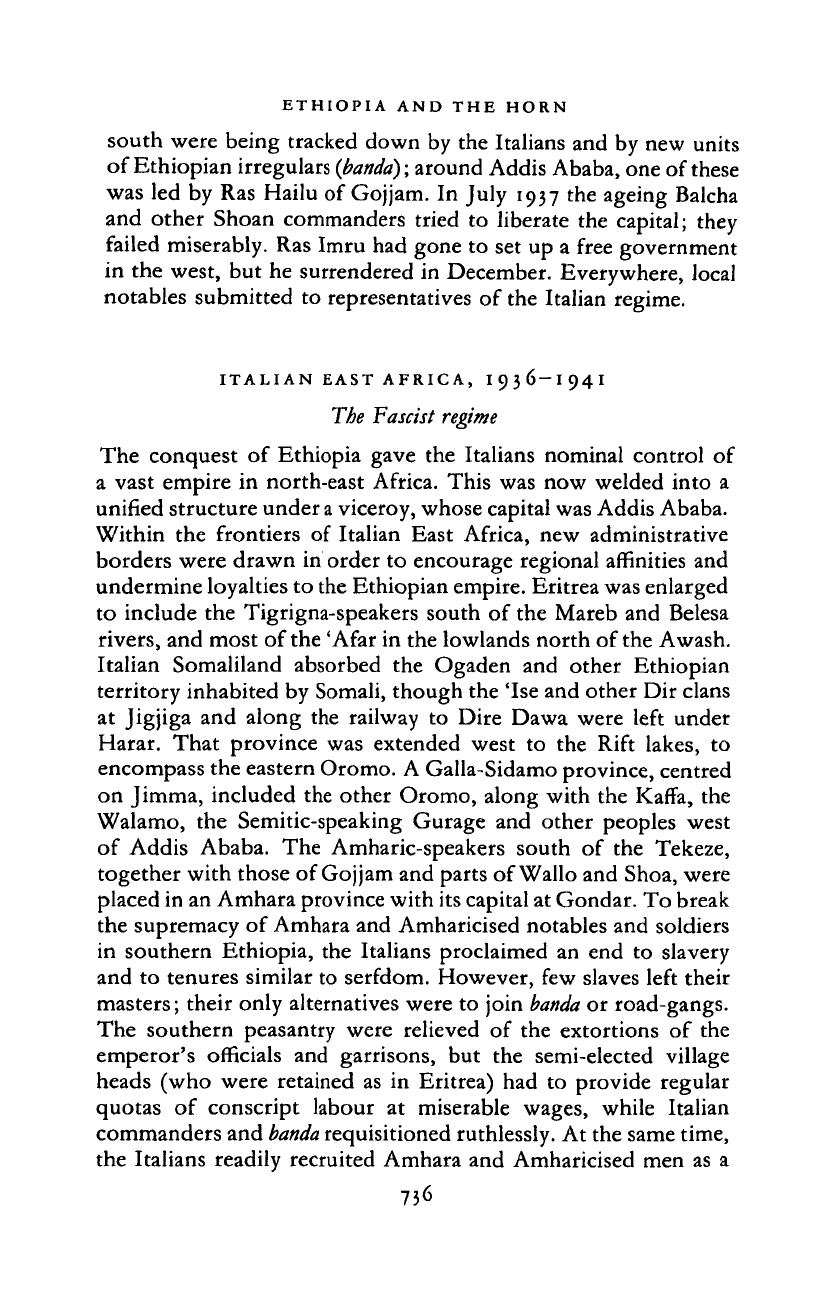
ETHIOPIA AND THE HORN
south were being tracked down by the Italians and by new units
of Ethiopian irregulars
{banda);
around Addis Ababa, one of these
was led by Ras Hailu of Gojjam. In July 1937 the ageing Balcha
and other Shoan commanders tried
to
liberate the capital; they
failed miserably. Ras Imru had gone to set up a free government
in the west, but he surrendered in December. Everywhere, local
notables submitted to representatives of the Italian regime.
ITALIAN EAST AFRICA, I936-I94I
The Fascist
regime
The conquest
of
Ethiopia gave the Italians nominal control of
a vast empire in north-east Africa. This was now welded into
a
unified structure under
a
viceroy, whose capital was Addis Ababa.
Within the frontiers
of
Italian East Africa, new administrative
borders were drawn in order to encourage regional affinities and
undermine loyalties to the Ethiopian empire. Eritrea was enlarged
to include the Tigrigna-speakers south of the Mareb and Belesa
rivers,
and most of the 'Afar in the lowlands north of the Awash.
Italian Somaliland absorbed
the
Ogaden and other Ethiopian
territory inhabited by Somali, though the 'Ise and other Dir clans
at Jigjiga and along the railway
to
Dire Dawa were left under
Harar. That province was extended west
to
the Rift lakes,
to
encompass the eastern Oromo. A Galla-Sidamo province, centred
on Jimma, included the other Oromo, along with the Kaffa, the
Walamo, the Semitic-speaking Gurage and other peoples west
of Addis Ababa. The Amharic-speakers south
of
the Tekeze,
together with those of Gojjam and parts of Wallo and Shoa, were
placed in an Amhara province with its capital at Gondar. To break
the supremacy of Amhara and Amharicised notables and soldiers
in southern Ethiopia, the Italians proclaimed an end
to
slavery
and to tenures similar to serfdom. However, few slaves left their
masters; their only alternatives were to join
banda
or road-gangs.
The southern peasantry were relieved
of
the extortions
of
the
emperor's officials and garrisons,
but the
semi-elected village
heads (who were retained as
in
Eritrea) had
to
provide regular
quotas
of
conscript labour
at
miserable wages, while Italian
commanders and
banda
requisitioned ruthlessly. At the same time,
the Italians readily recruited Amhara and Amharicised men as
a
736
Cambridge Histories Online © Cambridge University Press, 2008
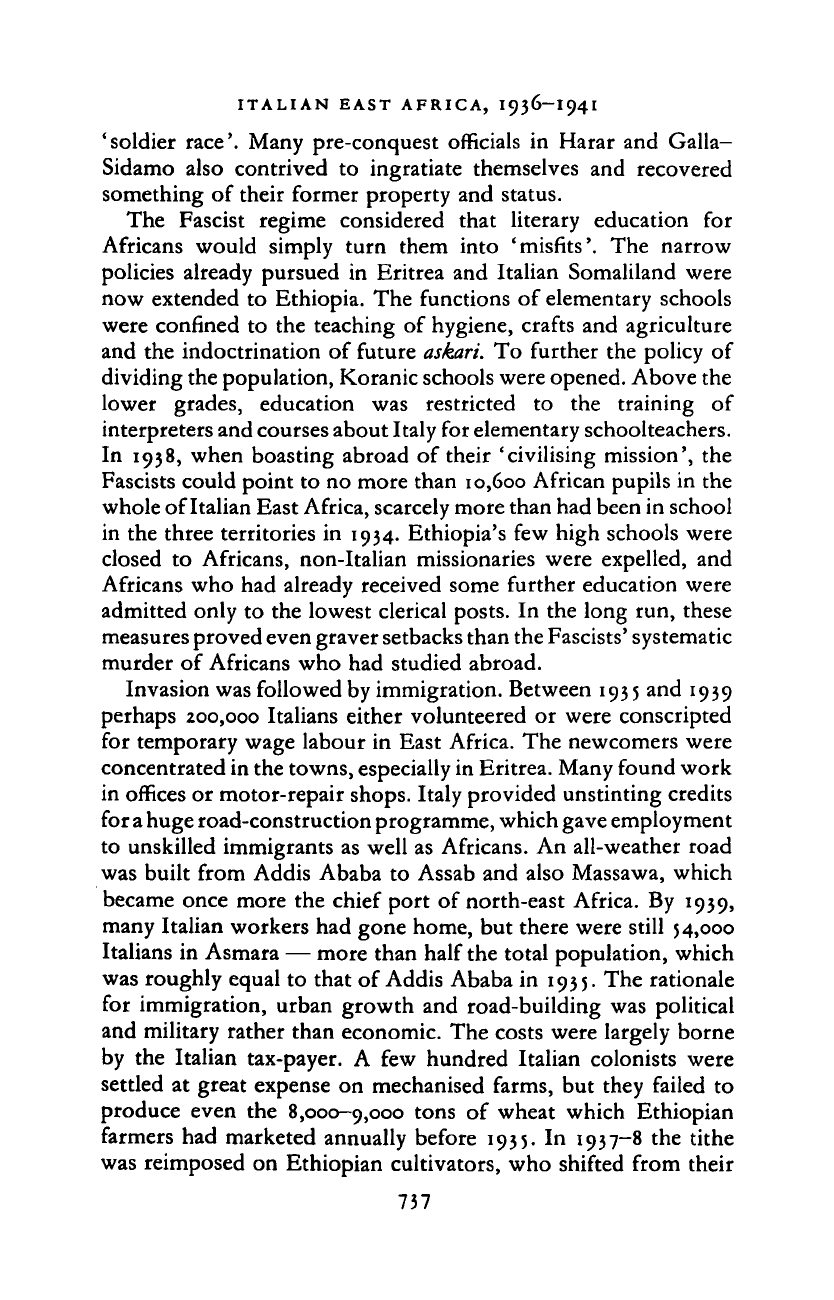
ITALIAN EAST AFRICA, I936-I941
'soldier race'. Many pre-conquest officials in Harar and Galla—
Sidamo also contrived to ingratiate themselves and recovered
something of their former property and status.
The Fascist regime considered that literary education for
Africans would simply turn them into 'misfits'. The narrow
policies already pursued in Eritrea and Italian Somaliland were
now extended to Ethiopia. The functions of elementary schools
were confined to the teaching of hygiene, crafts and agriculture
and the indoctrination of future
askari.
To further the policy of
dividing the population, Koranic schools were opened. Above the
lower grades, education was restricted to the training of
interpreters and courses about Italy for elementary schoolteachers.
In 1938, when boasting abroad of their 'civilising mission', the
Fascists could point to no more than 10,600 African pupils in the
whole of Italian East Africa, scarcely more than had been in school
in the three territories in 1934. Ethiopia's few high schools were
closed to Africans, non-Italian missionaries were expelled, and
Africans who had already received some further education were
admitted only to the lowest clerical posts. In the long run, these
measures proved even graver setbacks than the Fascists' systematic
murder of Africans who had studied abroad.
Invasion was followed by immigration. Between 1935 and 1939
perhaps 200,000 Italians either volunteered or were conscripted
for temporary wage labour in East Africa. The newcomers were
concentrated in the towns, especially in Eritrea. Many found work
in offices or motor-repair shops. Italy provided unstinting credits
for a huge road-construction programme, which gave employment
to unskilled immigrants as well as Africans. An all-weather road
was built from Addis Ababa to Assab and also Massawa, which
became once more the chief port of north-east Africa. By 1939,
many Italian workers had gone home, but there were still 54,000
Italians in Asmara — more than half the total population, which
was roughly equal to that of Addis Ababa in 1935. The rationale
for immigration, urban growth and road-building was political
and military rather than economic. The costs were largely borne
by the Italian tax-payer. A few hundred Italian colonists were
settled at great expense on mechanised farms, but they failed to
produce even the 8,000-9,000 tons of wheat which Ethiopian
farmers had marketed annually before 1935. In 1937-8 the tithe
was reimposed on Ethiopian cultivators, who shifted from their
737
Cambridge Histories Online © Cambridge University Press, 2008
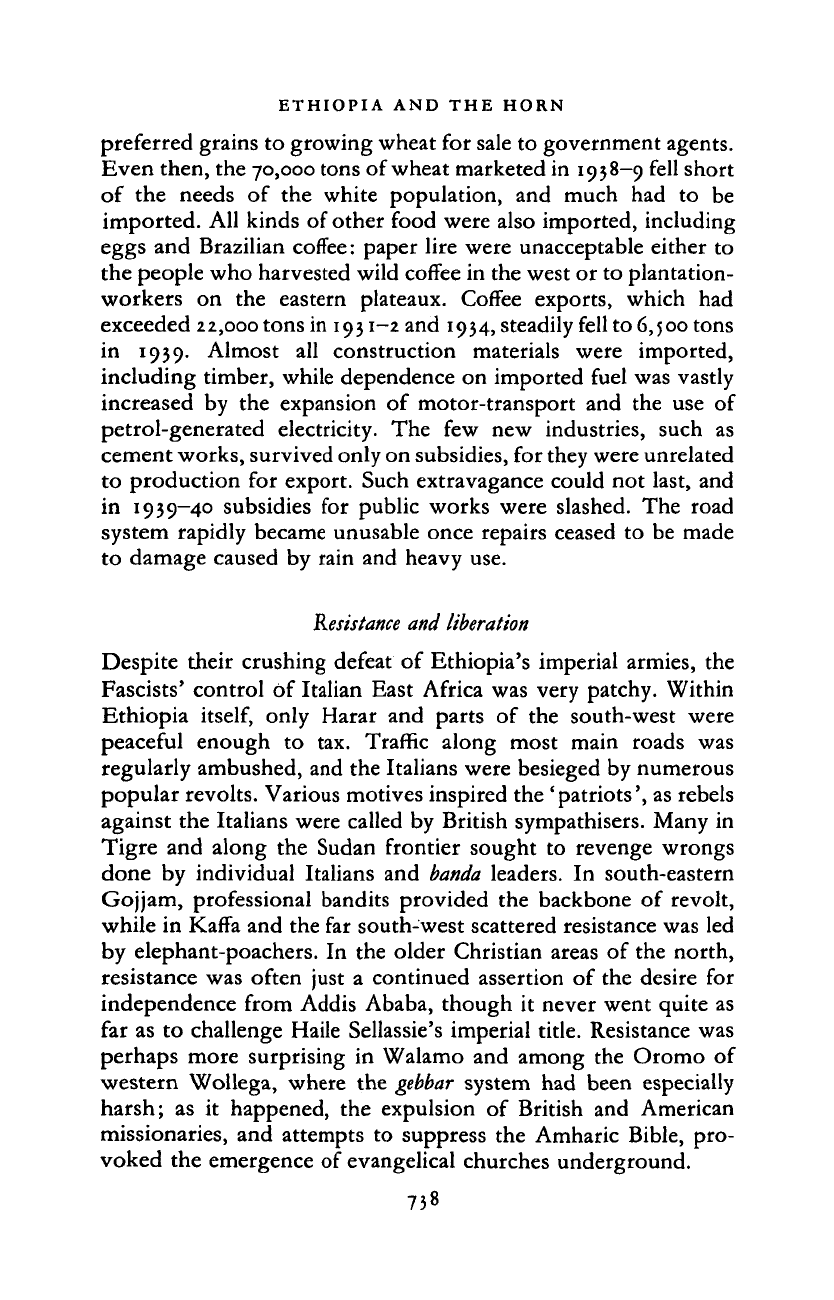
ETHIOPIA AND THE HORN
preferred grains to growing wheat for sale to government agents.
Even then, the 70,000 tons of wheat marketed in 1958—9 fell short
of the needs of the white population, and much had to be
imported. All kinds of other food were also imported, including
eggs and Brazilian coffee: paper lire were unacceptable either to
the people who harvested wild coffee in the west or to plantation-
workers on the eastern plateaux. Coffee exports, which had
exceeded 22,000 tons in 1931-2 and 1934, steadily fell to 6,500 tons
in 1939. Almost all construction materials were imported,
including timber, while dependence on imported fuel was vastly
increased by the expansion of motor-transport and the use of
petrol-generated electricity. The few new industries, such as
cement works, survived only on subsidies, for they were unrelated
to production for export. Such extravagance could not last, and
in 1939-40 subsidies for public works were slashed. The road
system rapidly became unusable once repairs ceased to be made
to damage caused by rain and heavy use.
Resistance and liberation
Despite their crushing defeat of Ethiopia's imperial armies, the
Fascists' control of Italian East Africa was very patchy. Within
Ethiopia
itself,
only Harar and parts of the south-west were
peaceful enough to tax. Traffic along most main roads was
regularly ambushed, and the Italians were besieged by numerous
popular revolts. Various motives inspired the 'patriots', as rebels
against the Italians were called by British sympathisers. Many in
Tigre and along the Sudan frontier sought to revenge wrongs
done by individual Italians and
banda
leaders. In south-eastern
Gojjam, professional bandits provided the backbone of revolt,
while in Kaffa and the far south-west scattered resistance was led
by elephant-poachers. In the older Christian areas of the north,
resistance was often just a continued assertion of the desire for
independence from Addis Ababa, though it never went quite as
far as to challenge Haile Sellassie's imperial title. Resistance was
perhaps more surprising in Walamo and among the Oromo of
western Wollega, where the
gebbar
system had been especially
harsh; as it happened, the expulsion of British and American
missionaries, and attempts to suppress the Amharic Bible, pro-
voked the emergence of evangelical churches underground.
738
Cambridge Histories Online © Cambridge University Press, 2008
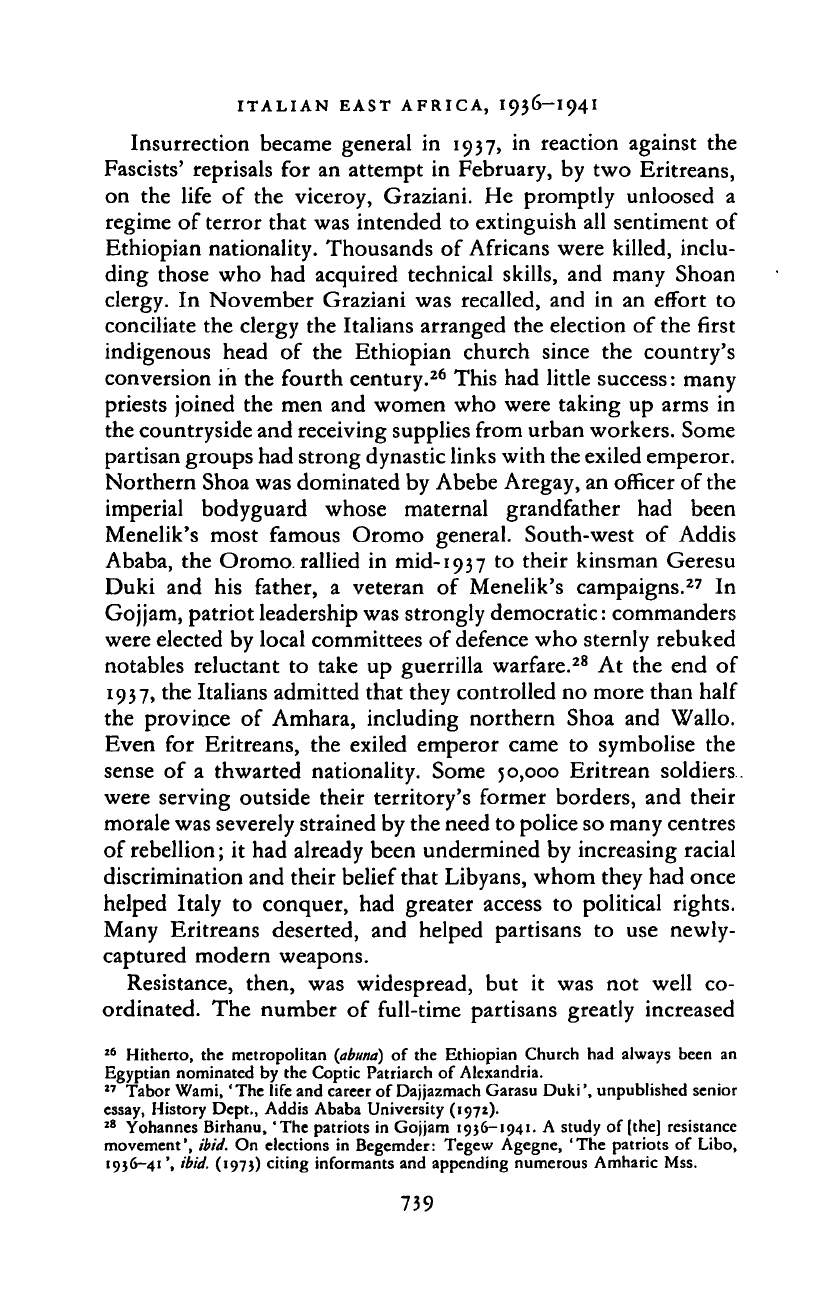
ITALIAN EAST AFRICA, 1936-1941
Insurrection became general in 1937, in reaction against the
Fascists' reprisals for an attempt in February, by two Eritreans,
on the life of the viceroy, Graziani. He promptly unloosed a
regime of terror that was intended to extinguish all sentiment of
Ethiopian nationality. Thousands of Africans were killed, inclu-
ding those who had acquired technical skills, and many Shoan
clergy. In November Graziani was recalled, and in an effort to
conciliate the clergy the Italians arranged the election of the first
indigenous head of the Ethiopian church since the country's
conversion in the fourth century.
26
This had little success: many
priests joined the men and women who were taking up arms in
the countryside and receiving supplies from urban workers. Some
partisan groups had strong dynastic links with the exiled emperor.
Northern Shoa was dominated by Abebe Aregay, an officer of the
imperial bodyguard whose maternal grandfather had been
Menelik's most famous Oromo general. South-west of Addis
Ababa, the Oromo.rallied in mid-1937 to their kinsman Geresu
Duki and his father, a veteran of Menelik's campaigns.
27
In
Gojjam, patriot leadership was strongly democratic: commanders
were elected by local committees of defence who sternly rebuked
notables reluctant to take up guerrilla warfare.
28
At the end of
1937,
the Italians admitted that they controlled no more than half
the province of Amhara, including northern Shoa and Wallo.
Even for Eritreans, the exiled emperor came to symbolise the
sense of a thwarted nationality. Some 50,000 Eritrean soldiers,
were serving outside their territory's former borders, and their
morale was severely strained by the need to police so many centres
of rebellion; it had already been undermined by increasing racial
discrimination and their belief that Libyans, whom they had once
helped Italy to conquer, had greater access to political rights.
Many Eritreans deserted, and helped partisans to use newly-
captured modern weapons.
Resistance, then, was widespread, but it was not well co-
ordinated. The number of full-time partisans greatly increased
26
Hitherto, the metropolitan
(abuna)
of the Ethiopian Church had always been an
Egyptian nominated by the Coptic Patriarch of Alexandria.
" Tabor Wami, 'The life and career of Dajjazmach Garasu Duki', unpublished senior
essay, History Dept., Addis Ababa University (1972).
28
Yohannes Birhanu, 'The patriots in Gojjam 19)6-1941. A study of [the] resistance
movement',
ibid.
On elections in Begemder: Tegew Agegne, 'The patriots of Libo,
1936-41',
ibid.
(197J) citing informants and appending numerous Amharic Mss.
739
Cambridge Histories Online © Cambridge University Press, 2008
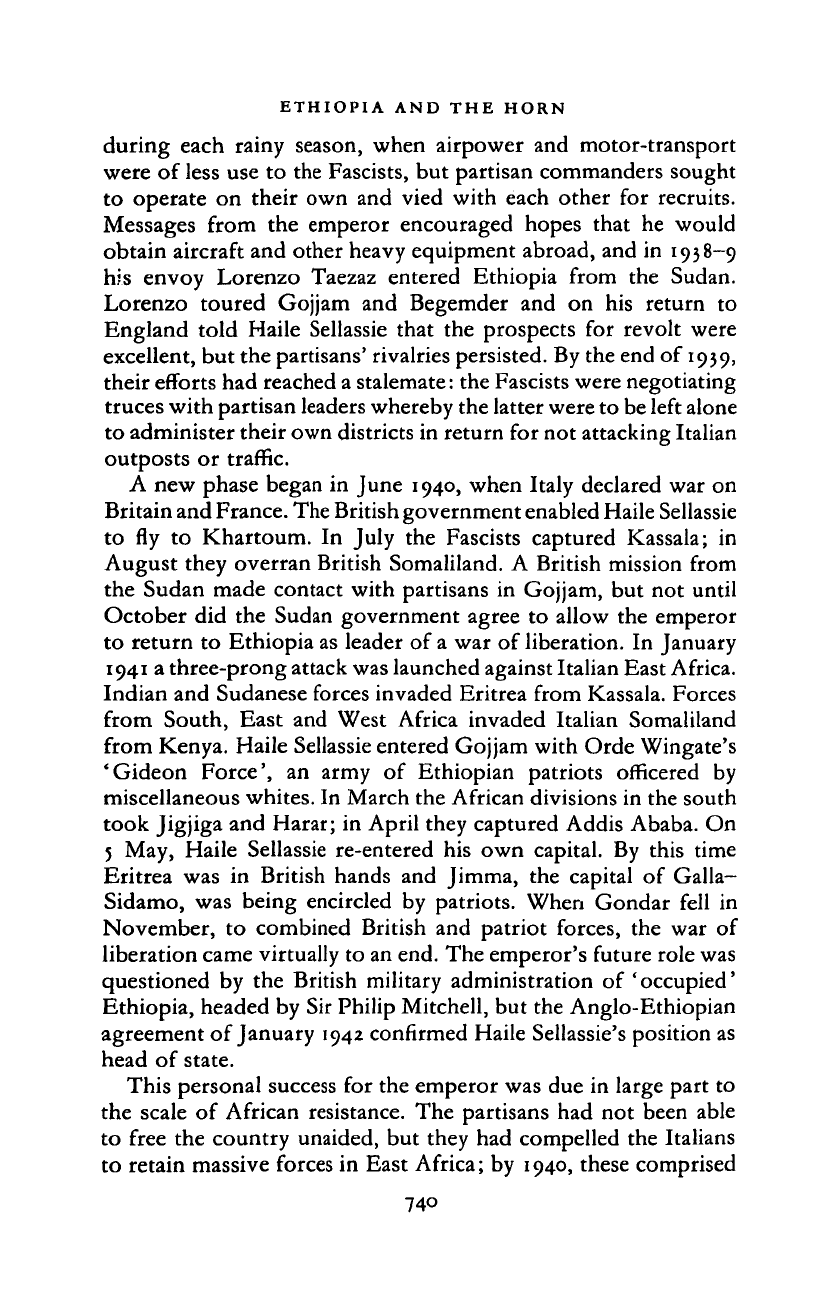
ETHIOPIA AND THE HORN
during each rainy season, when airpower and motor-transport
were of less use to the Fascists, but partisan commanders sought
to operate
on
their own and vied with each other for recruits.
Messages from the emperor encouraged hopes that
he
would
obtain aircraft and other heavy equipment abroad, and in 1938-9
his envoy Lorenzo Taezaz entered Ethiopia from
the
Sudan.
Lorenzo toured Gojjam and Begemder and
on his
return
to
England told Haile Sellassie that the prospects
for
revolt were
excellent, but the partisans' rivalries persisted. By the end of 1939,
their efforts had reached a stalemate: the Fascists were negotiating
truces with partisan leaders whereby the latter were to be left alone
to administer their own districts in return for not attacking Italian
outposts or traffic.
A new phase began in June 1940, when Italy declared war on
Britain and France. The British government enabled Haile Sellassie
to
fly to
Khartoum.
In
July the Fascists captured Kassala;
in
August they overran British Somaliland. A British mission from
the Sudan made contact with partisans in Gojjam, but not until
October did the Sudan government agree to allow the emperor
to return to Ethiopia as leader of a war of liberation. In January
1941 a three-prong attack was launched against Italian East Africa.
Indian and Sudanese forces invaded Eritrea from Kassala. Forces
from South, East and West Africa invaded Italian Somaliland
from Kenya. Haile Sellassie entered Gojjam with Orde Wingate's
'Gideon Force',
an
army
of
Ethiopian patriots officered
by
miscellaneous whites. In March the African divisions in the south
took Jigjiga and Harar; in April they captured Addis Ababa. On
5 May, Haile Sellassie re-entered his own capital. By this time
Eritrea was
in
British hands and Jimma, the capital
of
Galla—
Sidamo, was being encircled by patriots. When Gondar fell
in
November,
to
combined British and patriot forces, the war of
liberation came virtually to an end. The emperor's future role was
questioned by the British military administration of'occupied'
Ethiopia, headed by Sir Philip Mitchell, but the Anglo-Ethiopian
agreement of January 1942 confirmed Haile Sellassie's position as
head of state.
This personal success for the emperor was due in large part to
the scale
of
African resistance. The partisans had not been able
to free the country unaided, but they had compelled the Italians
to retain massive forces in East Africa; by 1940, these comprised
740
Cambridge Histories Online © Cambridge University Press, 2008
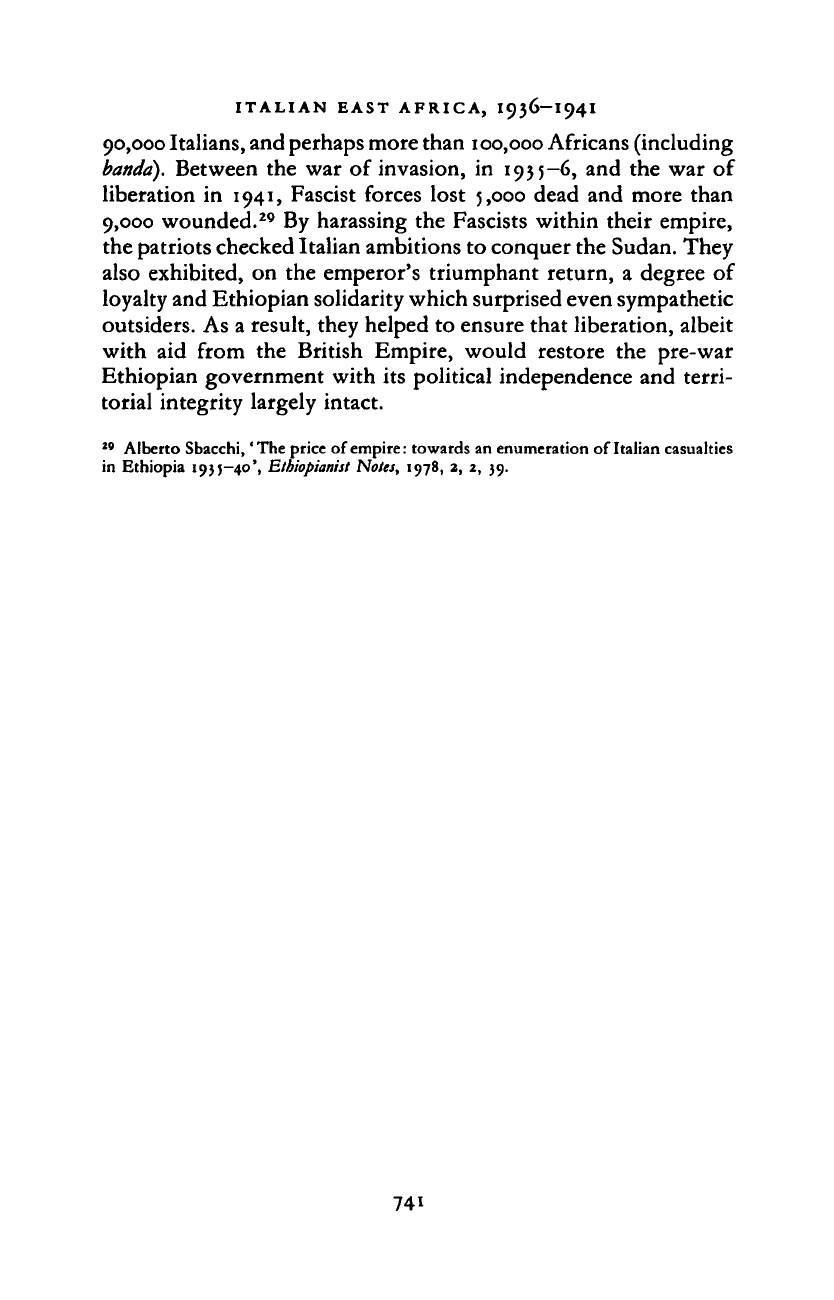
ITALIAN EAST AFRICA, I936-I94I
90,000
Italians,
and perhaps more than 100,000 Africans (including
banda).
Between the war of invasion, in 1935-6, and the war of
liberation in 1941, Fascist forces lost
5,000
dead and more than
9,000
wounded.
29
By harassing the Fascists within their empire,
the patriots checked Italian ambitions to conquer the Sudan. They
also exhibited, on the emperor's triumphant return, a degree of
loyalty and Ethiopian solidarity which surprised even sympathetic
outsiders. As a result, they helped to ensure that liberation, albeit
with aid from the British Empire, would restore the pre-war
Ethiopian government with its political independence and terri-
torial integrity largely intact.
29
Alberto Sbacchi, 'The price of
empire:
towards an en
in Ethiopia 1935-40', Ethiopians! Notes, 1978, 2, 2, 39.
enumeration of Italian casualties
741
Cambridge Histories Online © Cambridge University Press, 2008
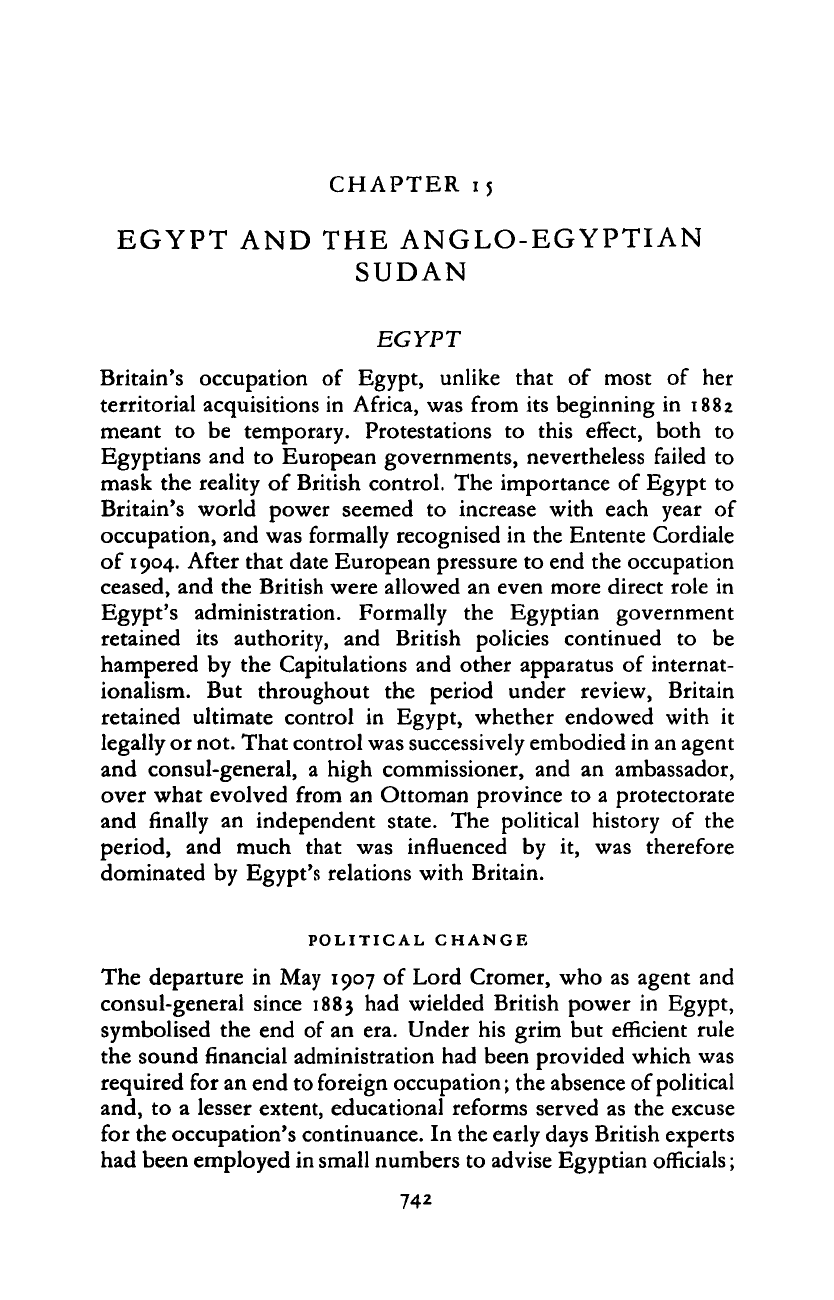
CHAPTER
15
EGYPT
AND THE
ANGLO-EGYPTIAN
SUDAN
EGYPT
Britain's occupation
of
Egypt, unlike that
of
most
of her
territorial acquisitions
in
Africa, was from
its
beginning
in
1882
meant
to be
temporary. Protestations
to
this effect, both
to
Egyptians
and
to
European governments, nevertheless failed
to
mask
the
reality
of
British control.
The
importance
of
Egypt
to
Britain's world power seemed
to
increase with each year
of
occupation,
and
was formally recognised
in
the Entente Cordiale
of 1904. After that date European pressure
to
end the occupation
ceased,
and the
British were allowed
an
even more direct role
in
Egypt's administration. Formally
the
Egyptian government
retained
its
authority,
and
British policies continued
to be
hampered
by
the
Capitulations
and
other apparatus
of
internat-
ionalism.
But
throughout
the
period under review, Britain
retained ultimate control
in
Egypt, whether endowed with
it
legally or not. That control was successively embodied in an agent
and consul-general,
a
high commissioner,
and
an
ambassador,
over what evolved from
an
Ottoman province
to a
protectorate
and finally
an
independent state.
The
political history
of
the
period,
and
much that
was
influenced
by it,
was
therefore
dominated
by
Egypt's relations with Britain.
POLITICAL CHANGE
The departure
in
May 1907
of
Lord Cromer,
who
as
agent
and
consul-general since 1883
had
wielded British power
in
Egypt,
symbolised
the end
of
an era.
Under
his
grim
but
efficient rule
the sound financial administration
had
been provided which was
required
for
an end to foreign occupation; the absence of political
and,
to
a
lesser extent, educational reforms served
as
the
excuse
for the occupation's continuance.
In
the early days British experts
had been employed in small numbers
to
advise Egyptian officials;
742
Cambridge Histories Online © Cambridge University Press, 2008
